Moses and Hellenism
In a provocative new work recently published in German, Bernd Witte proposes nothing less than an “alternative history of German culture,” as the subtitle of his finely wrought work of scholarship tells us. Moses and Homer: Greeks, Jews, Germans is a historical and cultural argument animated by powerful indignation. This history, he insists, has yet to be fully confronted.
Like most important works of intellectual passion, Witte’s book reflects his autobiographical circumstances. He was born in Germany in 1942 and clearly belongs to a war generation that gradually became aware of Germany’s great guilt and the necessity to grapple with it firmly and honestly. Witte was originally trained as a classicist, grounded in the manifold enchantments of the Greek world and uninstructed in Jewish tradition. However, as a young German, upon meeting Jewish intellectuals such as Jean Bollack, Paul Celan, and Peter Szondi in the 1960s, he excitedly discovered what he describes as a lost world, an “intellectual cosmos.” He is now perhaps best known as the first biographer of Walter Benjamin and has devoted much of his later career to aspects of that European and especially German Jewish firmament. He is presently the chief coeditor of an ambitious multivolume project to collect and publish all of Martin Buber’s writings.
Moses and Homer is essentially a work of homage and witness. It combines Witte’s affirmation of Judaism’s ethical and social values with a shocked indictment of the German obsession with ancient Greece, which he sees as culminating in Nazism and genocide. His book is a provocative tour de force, ranging through the entirety of modern German high culture. Witte argues that modern Germany’s ever-insistent worship of Greece was almost inevitably coupled with a negation of the monotheistic Judaic tradition. Worship of Homer was dialectically related to contempt for Moses. Witte shows that German Jews, too, were entangled in this discourse, forced to synthesize it with their Jewish commitments or, in some cases, actively subvert it.
Beginning around 1770, Witte argues, the German idealization of the ancient Greek world—its cult of beauty and the body, its ideal of the noble warrior, its polytheistic reverence for “Nature”—evolved into an antimonotheistic, anti-Judaic tradition. In close readings, he shows that virtually all of the main literary and philosophical giants of German classicism—Winckelmann, Goethe, Herder, Schiller, Hölderlin, Hegel, and Fichte—are implicated. Heidegger’s Greek-inspired anti-Semitic ravings turn out, in Witte’s narrative, to have a long and distinguished pedigree.
To be sure, others preceded Witte in pointing out the dangers of Hellenic worship as a national model for Germany. In 1935, the English scholar E. M. Butler published The Tyranny of Greece Over Germany. Though she made little explicit reference to contemporary events, she clearly had in mind the racially politicized and neopagan currents coursing through Nazi Germany. But Witte has a great deal new to say, not least in his analysis of the many Jewish interventions in this culture-defining discourse.
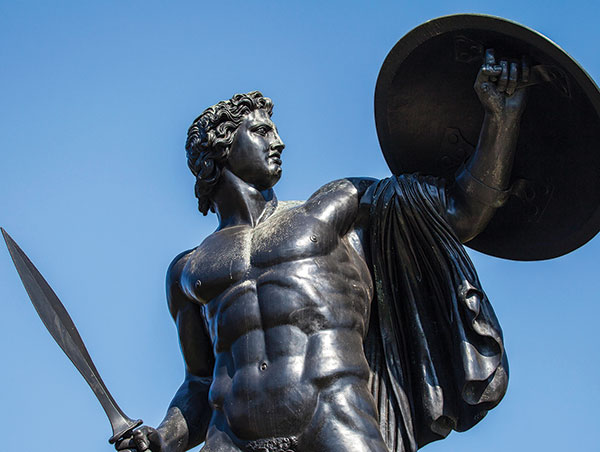
Witte begins by juxtaposing Heraclitus’s prescription that “War is the father of all and the king of all” with Isaiah’s proclamation that “nation shall not lift up sword against nation, neither shall they learn war anymore.” At the founding core of what he dubs this Greco-Germanic “counterreligion” stands the 18th-century art historian and archaeologist Johann Joachim Winckelmann. Witte regards Winckelmann’s idolization of the naked body as concretized in ancient Greek sculpture as the negation of the Jewish prohibition against images. Plastic representations of human form served to gradually displace Judaism’s rational text- and word-centered culture. Here Witte could have buttressed his case with the work of a historian whom he does not mention, George Mosse, who demonstrated that this archetype of noble Greek beauty and character often served as a foil to the ugly, misproportioned stereotype of the cunning, nervous, rootless Jew. (Ideals of beauty have always been part of racist thought.)
Somewhat surprisingly, Nietzsche, with his famous irrationalism, his anti-Christian and intoxicated Dionysian impulses, is not central to Witte’s story. Instead he concentrates on earlier figures, including Goethe, Schiller, Hegel, Herder, and Hölderlin. Each of these thinkers valorized Grecian ideals as part of their modernizing zeal, while attacking the God of Judaism and Christianity. But, Witte argues, because Christianity was supported by state power, their rhetorical onslaught was concentrated on Judaism. Under the rubric of ancient polytheism, these thinkers promulgated the worship of the cosmic forces of “Nature” and set the autonomous person—typically in the form of the conquering warrior—as their crowning ideal. Homeric history, Witte asserts, is one of murder, war, and death. Positing society as a ruthless site of struggle, German Grecophiles promoted a worldview that increasingly suppressed the Judaic affirmation of God-created life and the proscription, “Thou shalt not kill.” In its place, they constructed a ruthless image of society. This, Witte argues, was the other side of the Enlightenment, and it left a deep mark on 20th-century German culture.
Readers familiar with German Jewish history may be somewhat surprised by Witte’s account of these classical German thinkers as essentially neopagan and anti-Jewish. Most acculturating Jews at the time and even later—whatever their orientation—did not see things that way. Indeed, in their eyes, Goethe and Schiller were liberating heroes of German Jewry. They regarded them—and not all that mistakenly—as Enlightenment humanists who advocated reason and a secular culture of Bildung (ethical self-cultivation) that was open to everyone. It was only through these broad-minded and humanist postulates that newly acculturating Jews believed they could integrate into German culture. “The significance of Friedrich Schiller for the formation of Jewish attitudes toward Germany is almost incalculable,” wrote Gershom Scholem (who was not exactly a proponent of German Jewish assimilation). As “spokesman for pure humanity, lofty poet of the highest ideals of mankind, [he] represented everything they thought of, or wished to think of, as being German.”
Ernst Bloch, to take another example, regarded Goethe and Humboldt as the proper forerunners to his radical Marxist humanism. Indeed, these luminaries were perceived not only as embodying the best of Germanism and universalism but as strengthening a new kind of Jewishness. Scholem’s friend Walter Benjamin agreed that “above all, in a study of Goethe one finds one’s Jewish substance,” while the Zionist Kurt Blumenfeld argued that making Goethe a part of one’s life facilitated Jewish national consciousness! (Hindsight may judge these as tragic misperceptions, but Schiller, Goethe, and Humboldt certainly were welcome alternatives to both Christian and ultranationalist exclusion.)
Nonetheless, Witte shows Moses and the Jewish tradition were negatively caricatured not only by the usual ultranationalist and anti-Semitic suspects but by the classical thinkers of early German modernity. Indeed, he argues that even their seemingly positive portrayals were often anti-Jewish. Thus, while Schiller rendered Moses as an enlightened statesman, he dismissed the Jewish mob as a contemptible band of slaves and—in a theme that later became increasingly familiar and ominous—as traitors to the state. Herder’s Moses did lead and liberate homeless Jews, but they are portrayed as dishonorable vagabonds and parasites. (By contrast, Herder regarded Homer’s Greeks as ancient exemplars of patriotism.)
Goethe’s Moses, by and large, is a powerful, positive figure, but Witte focuses on an obscure—and hitherto relatively unremarked—piece Goethe wrote in the shadow of the French Revolution. In it, a Robespierre-like Moses not only fails to civilize his people but murders Egypt’s firstborn before he himself is murdered. In this way, Witte argues, Goethe dethroned Moses as the founder of Western civilization. The demonization of Moses reached its climax in 1933 with the German poet Gottfried Benn, who, though he regarded Sinai as one of the world’s most significant events, depicted Moses as “the greatest völkisch terrorist of all time and the greatest eugenicist of all nations,” the one who first brutally applied the laws of breeding for the greatest good of his own pure race and to the detriment of other foreign tribes.
There were German Jewish responses to such cultural attacks. Heinrich Heine, who had once called himself “a secret Greek,” traded in his Hegelian philhellenism for the prophetic tradition and portrayed Moses—rather than God—as the great emancipator of mankind, a kind of liberating socialist. Freud’s Moses and Monotheism retells the story of revelation as a Greek myth, where Moses (rather than God) is a kind of father, whose murder paradoxically results in the formation of abstract ethical and spiritual consciousness, indeed a superior Judaic civilization. Witte regards Freud’s story as an implicit response both to the Homeric and Nazi world of war and barbarity, and the many attempts to unseat Moses as the founder of Western culture. Martin Buber and Leo Baeck also sought to save the cultural memory of Moses as a foundational law-giving and ethical figure in opposition to both his cultured, philhellenic despisers and Nazi barbarism.
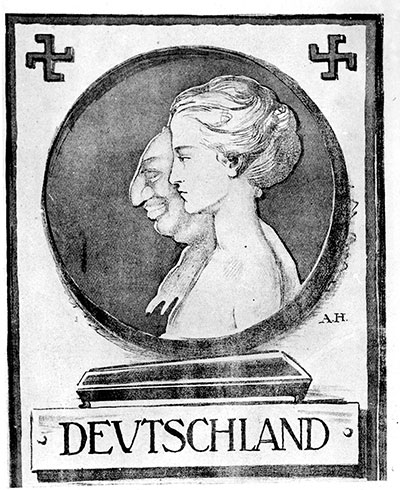
Witte also tells the less
well-known story of Gertrud Kantorowicz (a cousin of the famous historian Ernst
Kantorowicz), who was a historian of ancient art, poet, translator, disciple of
the charismatic poet Stefan George, and lover of the great sociologist Georg
Simmel. Intoxicated with ancient Greece, she tried to fuse what she saw as the
best of the worlds of Homer and Moses. After being turned back at the Swiss
border, she was sent to Theresienstadt, where she worked as a nurse, serving
her fellow inmates. Acutely aware of both the beauty and the vulnerability of
the human body, she developed an ethic of mental and physical service, an
affirmation of “whole life.” Incredibly hard working, by April 1945 she had
withered to no more than 80 pounds. On her deathbed, she was found reading
Homer in the original Greek. Witte sees her story as exemplifying both the
tragedy and the triumph of the German Jewish experience.
Witte’s work is scholarship as outraged personal reckoning. For Witte, the idolization of Greece and the concomitant ousting of monotheistic Judaism not only helped to shape modern German self-understanding and identity, but also paved the way to the murder of the Jews of Europe.
“A specific form of so-called Bildung,” he writes, “that transmitted an uncritical and unreflective human conception of Greece contributed to the fact that so many educated intellectuals could attach themselves to murderous National Socialist ideology.” Moses and Homer were transmuted into the collective bodies of the Volk and race by scholars who were heir to a morally flawed tradition. (Indeed, part of his anger consists of the fact that such individuals merged seamlessly back into postwar German academic life.) “In this perspective,” Witte writes, “the Shoah must not be seen as a break in Germany’s history . . . it is also a historical consequence of the paradigmatic exclusions that had their origins in 18th-century Germany.” He adds: “The beautiful dream of an ‘aesthetic’ education of mankind ended in the murder of ‘life-unworthy life’ and the attempt to finally exterminate the Jews of Europe.”
Here we need to pause. If the mountain of scholarship covering virtually every nook and cranny of German (and European) society is to be believed, nothing is a stranger to the Holocaust. In the field of German intellectual and cultural history alone, from the Teutons to Martin Luther, Hegel, Kant, Fichte, Treitschke, Nietzsche, and Wagner (and the list goes on) who has not been indicted? Many scholars, like Witte, assume that Germany pursued a qualitatively different and particularly dangerous path from the West (a so-called Sonderweg)that led, ultimately, to Auschwitz. Such studies often contain an account of a kind of disembodied “German Mind.” As Geoff Eley pointed out some time ago: This approach means “reconstructing the intellectual pursuits of an earlier epoch in the image of Nazi ideology. . . . All these ideas are described as in some way distinctively German and all are traced back to the eighteenth century as aspects of an unbroken linear continuity.”
Certainly, one must investigate the deeper roots of this catastrophe. Yet if nothing is alien to such a complex, multifactorial event, careful caveats and differentia
tions must be made. Thus, for example, it’s clear that without the vast contingent event of World War II, the Holocaust could not have occurred, but it would be more difficult to trace the outbreak of war in 1939 to philhellenism. Moreover, even if one leaves aside crucial economic, political, and bureaucratic forces and limit oneself to cultural analysis, one would at least have to mention demonizing medieval folk mythologies and the central place of a traditional and transfigured Christian (and later Protestant) Jew-hatred, as well as the important role of Nordic (as opposed to Greek) myths in the formation of the Aryan pantheon. Many tributaries ran into these muddy German waters.
For all that, Witte’s work is illuminating on many levels. He is not afraid to attack the vexed question of the ways in which both Jews and Germans imagined their peoplehood. He posits Jewish chosenness not as a doctrine of superiority or power but as one of morality, as duty to serve God and the ideals of the covenant always in pursuit of a just society. One of Witte’s aims is to restore such ethical consciousness to contemporary German culture. An accompanying danger to this admirable project, however, consists in an almost entirely uncritical, romanticized philosemitic approach (war and cruelty are not, after all, absent from biblical history, nor is contemporary, and sometimes insensitive, Jewish self-celebration).
On the other hand, Witte describes the German version of chosenness as diametrically opposed to the Jewish conception, emptying the idea of its metaphysical and religious content and transforming the highest ideals of the Greek model into a murderous superiority of blood, power, and race. Witte also draws our attention to the fact that Jewish chosenness came to be represented as a kind of arrogant and aggressive separatism—a cunning move whereby the victims were transformed into putative perpetrators. Even more challengingly, he suggests that there was a kind of ironic interdependence between the Jewish and German notions of the Chosen People. German racists often borrowed from the Jewish example in a kind of
perverse usurpation. Thus, Hitler himself invoked a distorted Judaism, writing that “no one knows better than the Jew” about blood purity.
I believe that a subtle, unstated, scholarly polemic runs underneath the text of Homer and Moses with regard to these issues. Between 1933 and 1945, Witte concludes, two opposed concepts of the Volk confronted each other:
Here the “Doric World” in National Socialist Berlin, and there in Theresienstadt and Jerusalem the “People of God.” Here the absolute power state, built upon war and genocide, the murderous and predatory society of the Third Reich, opposite the Utopia of a society that obeys God’s law and whose exponents sought to design a just and peaceful social order.
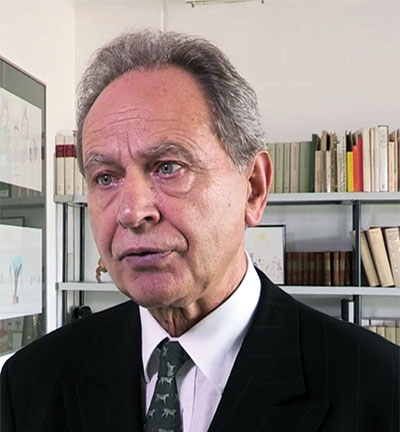
In the annoying absence of an index, I cannot be
sure, but as far as I can tell Witte only mentions the famous German
Egyptologist and cultural theorist Jan Assmann once. Yet, it seems to me that
the entire work stands as an intriguing refutation of Assmann’s most
provocative thesis. Assmann has argued that it is precisely the “Mosaic
distinction”—
between the one “true” God and “false” religion—that stands at the root of
Western “conflict, intolerance, and violence,” whereas ancient polytheism
rendered different cultures mutually compatible. Some have read Assmann as
arguing that because Jews initiated the “first distinction” and have been resented
for it ever since, they may have been, in some sense, partly responsible for
the ghastly fate that overtook them.
We should be grateful to Bernd Witte for having provided a powerful, if, perhaps, comparably essentialist, counterargument to Assmann, along with an intriguing, provocative rereading of the entire modern German intellectual tradition.
Suggested Reading
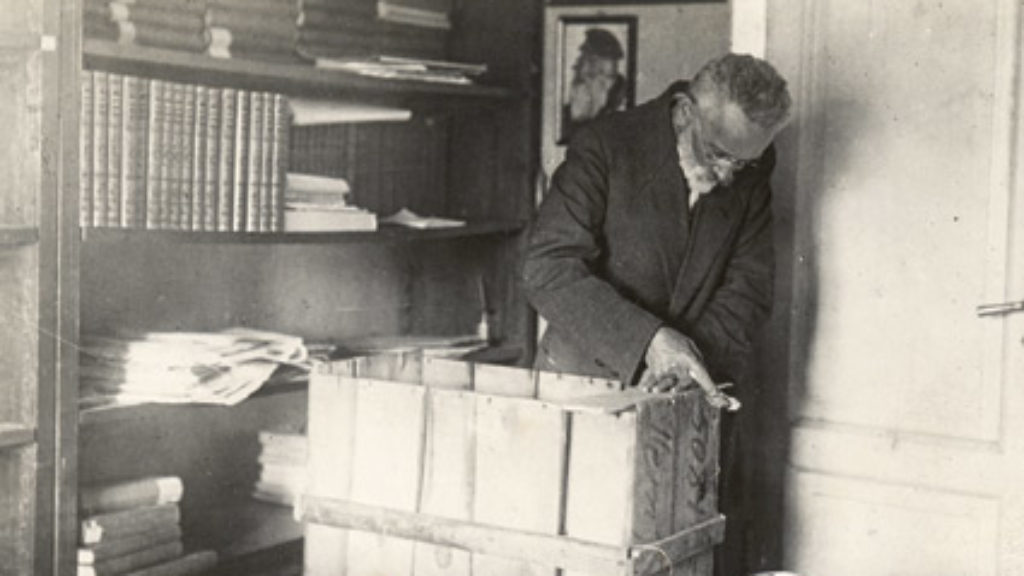
Where To: America or Palestine? Simon Dubnov’s Memoir of Emigration Debates in Tsarist Russia
Dubnov's magisterial autobiography, written while Dubnov was in exile from both the Soviet Union and Nazi Germany, takes the reader on a deeply personal journey through nearly a century of upheaval for the Jews of Eastern Europe. A new translation.

The Day Turned
One of Lea Goldberg’s last poems was inspired by a prayer from the Yom Kippur liturgy.
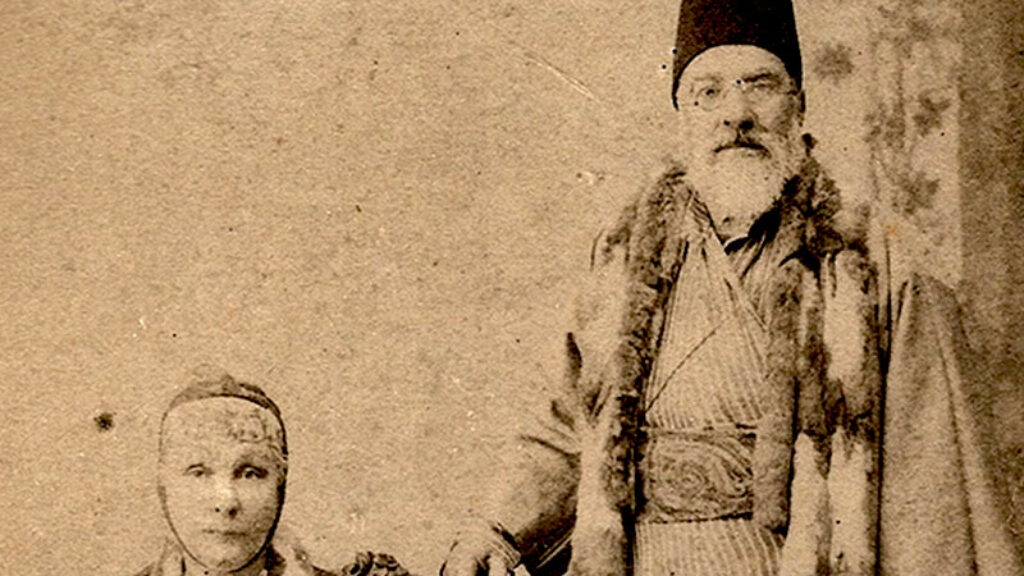
The Lost Voices of Salonica
Sarah Abrevaya Stein’s prodigious research, a true labor of love, gives voice to the long-silenced Salonican Jews.
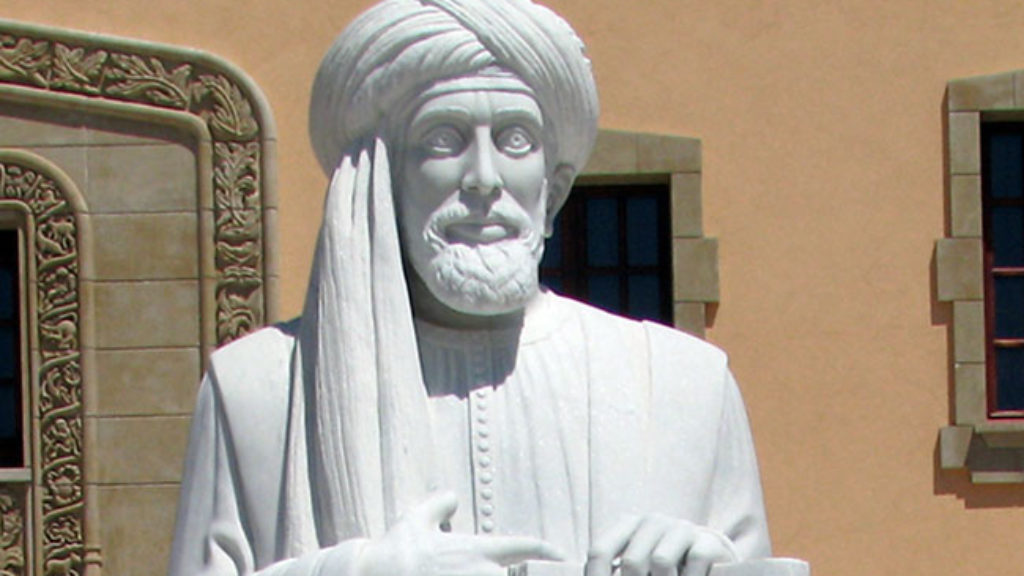
The Ubiquitous Gabirol
Solomon ibn Gabirol plunges into poetry, writes S. Y. Agnon, medabek atzmo be-charuz: glued to his craft, beading words with devotion.
Comments
You must log in to comment Log In